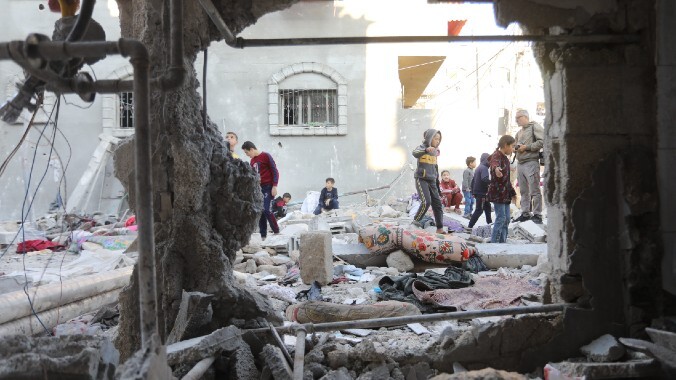After 10 Years & 3 Rounds of IVF, a Gaza Woman’s Twins Were Killed in an Instant
“I screamed for my children and my husband. They were all dead,” Rania Abu Anza told the AP. As questions about IVF accessibility loom across the U.S., American women aren’t the only people suffering.
Shutterstock Justice
Rania Abu Anza woke up in the middle of the night on Saturday to breastfeed her son Naeim, who slept in one of her arms. Her daughter, Wissam, was in the other. Rania, her children, and husband—who’d named Wissam after himself,—were among 35 of her displaced family members sheltering in a single house in Rafah when an Israeli airstrike struck the building. The attack came about an hour and a half after Rania had breastfed her son, and killed both her children and her husband, the Associated Press reported. Rania told the AP that she’d spent 10 years trying to have children and her twins, who had been born on October 13, right at the beginning of Israel’s latest siege on Gaza, were conceived after three rounds of IVF.
Rania’s weren’t the only children killed by the late-night attack. A doctor told the AP six children and four women were among the 14 others killed; one of those women was pregnant. That the victims were disproportionately women and children is part of a pattern that’s emerged: Gaza’s health ministry reported last month that 70% of those killed by Israeli attacks since October have been women and children. The United Nations reports that two mothers in Gaza are killed every hour.
“I screamed for my children and my husband. They were all dead,” Rania said. “I didn’t get enough of them. I swear I didn’t get enough of them.”
“Who will call me mother now? … My heart is gone,” Rania told Al Arabiya News. “What was their fault?” she asks, holding her dead children’s bodies. “What did a baby like this do?”
-

-

-

-

-

-

-

-

-

-

-

-

-

-

-

-

-

-

-

-

-

-

-

-

-

-

-

-

-

-

-

-

-

-

-

-

-

-

-

-








































